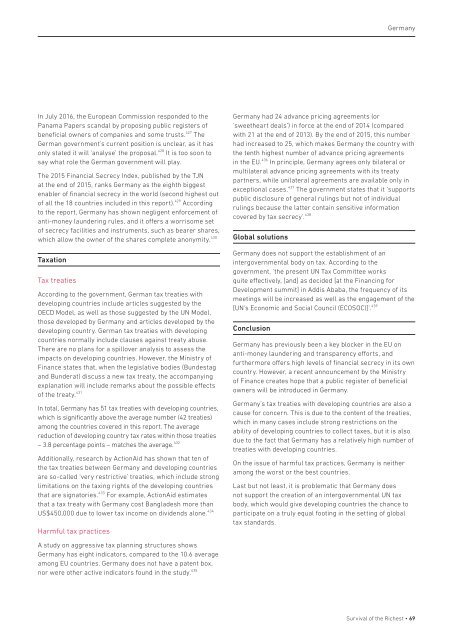Create successful ePaper yourself
Turn your PDF publications into a flip-book with our unique Google optimized e-Paper software.
Germany<br />
In July 2016, <strong>the</strong> European Commission responded to <strong>the</strong><br />
Panama Papers scandal by proposing public registers <strong>of</strong><br />
beneficial owners <strong>of</strong> companies and some trusts. 427 The<br />
German government’s current position is unclear, as it has<br />
only stated it will ‘analyse’ <strong>the</strong> proposal. 428 It is too soon to<br />
say what role <strong>the</strong> German government will play.<br />
The 2015 Financial Secrecy Index, published by <strong>the</strong> TJN<br />
at <strong>the</strong> end <strong>of</strong> 2015, ranks Germany as <strong>the</strong> eighth biggest<br />
enabler <strong>of</strong> financial secrecy in <strong>the</strong> world (second highest out<br />
<strong>of</strong> all <strong>the</strong> 18 countries included in this report). 429 According<br />
to <strong>the</strong> report, Germany has shown negligent enforcement <strong>of</strong><br />
anti-money laundering rules, and it <strong>of</strong>fers a worrisome set<br />
<strong>of</strong> secrecy facilities and instruments, such as bearer shares,<br />
which allow <strong>the</strong> owner <strong>of</strong> <strong>the</strong> shares complete anonymity. 430<br />
Taxation<br />
Tax treaties<br />
According to <strong>the</strong> government, German tax treaties with<br />
developing countries include articles suggested by <strong>the</strong><br />
OECD Model, as well as those suggested by <strong>the</strong> UN Model,<br />
those developed by Germany and articles developed by <strong>the</strong><br />
developing country. German tax treaties with developing<br />
countries normally include clauses against treaty abuse.<br />
There are no plans for a spillover analysis to assess <strong>the</strong><br />
impacts on developing countries. However, <strong>the</strong> Ministry <strong>of</strong><br />
Finance states that, when <strong>the</strong> legislative bodies (Bundestag<br />
and Bunderat) discuss a new tax treaty, <strong>the</strong> accompanying<br />
explanation will include remarks about <strong>the</strong> possible effects<br />
<strong>of</strong> <strong>the</strong> treaty. 431<br />
In total, Germany has 51 tax treaties with developing countries,<br />
which is significantly above <strong>the</strong> average number (42 treaties)<br />
among <strong>the</strong> countries covered in this report. The average<br />
reduction <strong>of</strong> developing country tax rates within those treaties<br />
– 3.8 percentage points – matches <strong>the</strong> average. 432<br />
Additionally, research by ActionAid has shown that ten <strong>of</strong><br />
<strong>the</strong> tax treaties between Germany and developing countries<br />
are so-called ‘very restrictive’ treaties, which include strong<br />
limitations on <strong>the</strong> taxing rights <strong>of</strong> <strong>the</strong> developing countries<br />
that are signatories. 433 For example, ActionAid estimates<br />
that a tax treaty with Germany cost Bangladesh more than<br />
US$450,000 due to lower tax income on dividends alone. 434<br />
Harmful tax practices<br />
Germany had 24 advance pricing agreements (or<br />
‘swee<strong>the</strong>art deals’) in force at <strong>the</strong> end <strong>of</strong> 2014 (compared<br />
with 21 at <strong>the</strong> end <strong>of</strong> 2013). By <strong>the</strong> end <strong>of</strong> 2015, this number<br />
had increased to 25, which makes Germany <strong>the</strong> country with<br />
<strong>the</strong> tenth highest number <strong>of</strong> advance pricing agreements<br />
in <strong>the</strong> EU. 436 In principle, Germany agrees only bilateral or<br />
multilateral advance pricing agreements with its treaty<br />
partners, while unilateral agreements are available only in<br />
exceptional cases. 437 The government states that it ‘supports<br />
public disclosure <strong>of</strong> general rulings but not <strong>of</strong> individual<br />
rulings because <strong>the</strong> latter contain sensitive information<br />
covered by tax secrecy’. 438<br />
Global solutions<br />
Germany does not support <strong>the</strong> establishment <strong>of</strong> an<br />
intergovernmental body on tax. According to <strong>the</strong><br />
government, ‘<strong>the</strong> present UN Tax Committee works<br />
quite effectively, [and] as decided [at <strong>the</strong> Financing for<br />
Development summit] in Addis Ababa, <strong>the</strong> frequency <strong>of</strong> its<br />
meetings will be increased as well as <strong>the</strong> engagement <strong>of</strong> <strong>the</strong><br />
[UN’s Economic and Social Council (ECOSOC)]’. 439<br />
Conclusion<br />
Germany has previously been a key blocker in <strong>the</strong> EU on<br />
anti-money laundering and transparency efforts, and<br />
fur<strong>the</strong>rmore <strong>of</strong>fers high levels <strong>of</strong> financial secrecy in its own<br />
country. However, a recent announcement by <strong>the</strong> Ministry<br />
<strong>of</strong> Finance creates hope that a public register <strong>of</strong> beneficial<br />
owners will be introduced in Germany.<br />
Germany’s tax treaties with developing countries are also a<br />
cause for concern. This is due to <strong>the</strong> content <strong>of</strong> <strong>the</strong> treaties,<br />
which in many cases include strong restrictions on <strong>the</strong><br />
ability <strong>of</strong> developing countries to collect taxes, but it is also<br />
due to <strong>the</strong> fact that Germany has a relatively high number <strong>of</strong><br />
treaties with developing countries.<br />
On <strong>the</strong> issue <strong>of</strong> harmful tax practices, Germany is nei<strong>the</strong>r<br />
among <strong>the</strong> worst or <strong>the</strong> best countries.<br />
Last but not least, it is problematic that Germany does<br />
not support <strong>the</strong> creation <strong>of</strong> an intergovernmental UN tax<br />
body, which would give developing countries <strong>the</strong> chance to<br />
participate on a truly equal footing in <strong>the</strong> setting <strong>of</strong> global<br />
tax standards.<br />
A study on aggressive tax planning structures shows<br />
Germany has eight indicators, compared to <strong>the</strong> 10.6 average<br />
among EU countries. Germany does not have a patent box,<br />
nor were o<strong>the</strong>r active indicators found in <strong>the</strong> study. 435<br />
<strong>Survival</strong> <strong>of</strong> <strong>the</strong> <strong>Richest</strong> • 69


